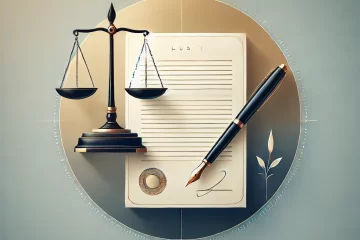![]()
Introduction
Contract drafting is a hugely profitable and rewarding part of any law practice. Contract drafting generates a significant portion of revenue for both individual lawyers and organized law firms, and it is typically a reliable and profitable revenue stream. Contract drafting and negotiation, in contrast to many other areas of work that are unpredictable in terms of time and effort investment, is a more predictable process with high margins. The best part is that contract drafting can provide a good living for even young lawyers. Many young litigators who are working hard to establish themselves in the courtroom as arguing counsel earn significantly less money from their litigation practice. Contract drafting on the sidelines, on the other hand, helps pay the bills. If they can source enough drafting work to boost their practice’s revenues, many lawyers with fledgling practices hire juniors to do contract drafting.
Big law firms typically make a lot of money from transactional practices like mergers and acquisitions, banking, projects, and corporate finance, which require a lot of contract drafting and negotiation. As a result, having strong contract drafting and negotiation skills is critical for success in large law firms, particularly in transactional practice areas, which are typically more lucrative. Many big law firms pay litigation associates and IP law associates less than those who handle transactions, especially at the entry level. Unless a lawyer is already very successful and established, there is no doubt that learning contract drafting and negotiation in a systematic manner is extremely beneficial. A well-drafted contract can protect a company’s legal interests. Contracts can also be used in everyday life, such as in informal relationships, to avoid unnecessary fear or risk. As a result, a contract that has been properly drafted and negotiated can avoid any confusion, which can result in lost time, money, and the value of the contract’s object. Contracts are two sides of a negotiated agreement that serve as a common reference point for both parties.
A contract is a legally binding agreement between two or more parties that can be enforced in a court of law and has the consent ad idem of the contracting parties. Contracts are made in all aspects of life. A contract is made and ‘exchanged’ when you buy or sell a home. You will almost certainly have a contract of employment when you start a new job. The money you give in exchange for the goods is referred to as the’ consideration’ in contract law. The meaning and importance of contracts are well understood by the business community, and those companies that have always placed a premium on written contracts have been more successful than others.
Steps in Drafting
The step-by-step inclusion of specific clauses, terms, and conditions that are expressed according to the needs and wants of the contracting party or parties is known as contract drafting. Various issues, such as the contract’s subject, the goods to be manufactured, the amount of consideration, indemnity, and dispute resolution, must all be considered when drafting a contract.
A draft must be reviewed once it is finished. Every person should, in my opinion, have a contract reviewed before signing it and entering into an agreement with the other parties to the contract. This type of review is known as pre-contract review, though in our experience, post-contract reviewing is the most common practice.
To put it another way, contract review is a thorough examination of the contract’s terms, clauses, and conditions. It is an attempt to comprehend each clause as well as the rationale for its creation. Every person has the option of conducting a thorough review of the contract themselves or enlisting the help of attorneys and advocates to do so on their behalf. We must remember that contract review can solve many problems and issues at an early stage, avoiding long-term losses or harassment.
The Basic Process
Firstly, the person drafting the contract must be aware of the contract’s purpose. It is necessary to comprehend the contract’s subject and object, as well as the parties’ roles in achieving the desired subject and object. The contract must specify the rights and obligations that the contracting parties have toward one another. Each party is there to accomplish a specific goal, and that goal and role must be easily and clearly understood while drafting and reviewing the contract.
Second, the contract’s feasibility must be considered: whether the contract’s terms and conditions can be carried out; whether the contract’s parties can carry out their rights and responsibilities; which party/parties gain the most and who bears the most liability during the contract’s duration; and so on. In order to determine the feasibility of a contract, such questions must be answered.
Finally, in future scenarios, one must be able to predict the issues, problems, and/or disputes that may arise as a result of the contract. The person drafting the contract, as well as the person reviewing it, must be able to recognize which terms and clauses may pose a risk of future disputes and/or losses between the parties. It’s also important to know which clauses in the contract contain the contract’s loopholes, as well as the various ways in which those loopholes could later be exploited by the contract’s parties.
Importance
The parties, responsibilities, and deadlines are all clearly defined in a well-written contract. It also prepares for potential problems and the unexpected. When it comes to contract drafting, the ability to account for the unexpected takes years of practice, which is why your lawyer is so important. The parties are usually preoccupied with the project and rarely consider the inherent risks in all contracts.
Financial stability of the companies, delays, personality clashes between the parties, and other unforeseen market conditions are examples of such risks. As a result, it’s critical that it covers worst-case scenarios to ensure that you’re covered if things don’t go as planned. Even more so, in today’s market, contractors and subcontractors are frequently so eager to get work that they either proceed without signing a contract or sign contracts that either do not make sense or are skewed heavily in favor of one party. Sometimes the contracts are drafted by the other party, who, understandably, did so to save money, but who, in doing so, may have created major problems if something goes wrong. Payment terms, such as stage payment dates and amounts, indemnity clauses, retention of title clauses, and insurance provisions, are all important elements of a well-drafted construction contract. When contractors draught their own contracts or do not have them reviewed by a third party, serious issues can arise. Without intending to, they may find themselves liable for the negligence of subcontractors, owners, or other parties involved in a project.
A contract that is unclear and does not clearly spell out each party’s obligations is ripe for potential litigation that will cost far more than the cost of hiring a lawyer to properly draft and/or review the contract before all parties sign it. As a result, having a solicitor to draft all of your business contracts, or at the very least providing you with one that you can use as a template, is essential to avoid costly litigation.
The Benefits of Possessing Contract Drafting Skills
The following are the benefits:
- The clarity of business contracts, agreements, and the rights and responsibilities of contract parties.
- Avoiding any potential contract disputes and litigation costs that may arise if no formal contract exists.
- To avoid any misrepresentation, communication confusion, or agreements.
- Contracts are critical for safeguarding intellectual property, real estate, and true asset values.
- Commercial contracts aid in the preservation of business relationships.
- Contractual clauses or agreements between parties regarding what to do in the event of a dispute, such as arbitration, mediation, or litigation in any court of a specific jurisdiction.
Conclusion
Every lawyer should be able to draft and review contracts, as well as have a secondary source of income. This type of drafting necessitates the lawyer’s ability to draft contracts. Various commercial agreements that must be drafted by lawyers according to the needs of clients include leave and license agreements, memorandums of understanding (MOU), confidentiality and non-disclosure agreements/non-circumvention, lease deeds, partnership agreements, and employment agreements. It is extremely difficult to understand contract law. As a result, contracts must be written in such a way that the rules apply to the parties who sign them.
The inclusion of the aforementioned terms and conditions will provide the reader with a detailed understanding of the contract’s goals and the parties’ relationship. Furthermore, if the clauses listed above are included in the contract, any dispute between the contracting parties can be resolved quickly. All of these efforts will result in a contract that will save a significant amount of time, effort, and money that would have been spent otherwise. In addition, reviewing drafted contracts is just as important as drafting them. If a contract is not thoroughly reviewed, the signing party or parties may be signing terms and clauses that are not advantageous to them and may cause them financial or mental harm in the future. The main purpose of contracts is to protect the parties in the event that one of them fails to fulfil their obligations. Any contract that is poorly written results in a loss for the party who fails to complete the contract. As a result, litigants must be proficient in contract drafting.



0 Comments